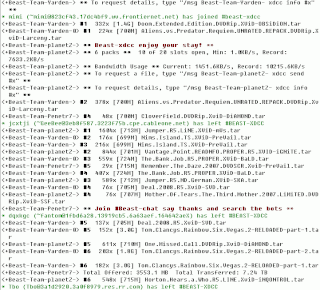Gnutella is a peer-to-peer network protocol. Founded in 2000, it was the first decentralized peer-to-peer network of its kind, leading to other, later networks adopting the model.

Peer-to-peer (P2P) computing or networking is a distributed application architecture that partitions tasks or workloads between peers. Peers are equally privileged, equipotent participants in the network, forming a peer-to-peer network of nodes. In addition, a personal area network (PAN) is also in nature a type of decentralized peer-to-peer network typically between two devices.

The term chat room, or chatroom, is primarily used to describe any form of synchronous conferencing, occasionally even asynchronous conferencing. The term can thus mean any technology, ranging from real-time online chat and online interaction with strangers to fully immersive graphical social environments.

XDCC is a computer file sharing method which uses the Internet Relay Chat (IRC) network as a host service.
WASTE is a peer-to-peer and friend-to-friend protocol and software application developed by Justin Frankel at Nullsoft in 2003 that features instant messaging, chat rooms, and file browsing/sharing capabilities. The name WASTE is a reference to Thomas Pynchon's novel The Crying of Lot 49. In the novel, W.A.S.T.E. is an underground postal service.

Soulseek is a peer-to-peer (P2P) file-sharing network and application, used mostly to exchange music.
Morpheus was a file sharing and searching peer-to-peer client for Microsoft Windows, developed and distributed by the company StreamCast, that originally used the OpenNap protocol, but later supported many different peer-to-peer protocols. On April 22, 2008, distributor StreamCast Networks filed for Chapter 7 bankruptcy after a long legal battle with music companies; all of their employees were laid off and the official download at www.morpheus.com stopped being available, though for a small period the website remained online. As of October 29, 2008, the official Morpheus website is offline, including all other websites owned by StreamCast Networks, specifically MusicCity.com, Streamcastnetworks.com and NeoNetwork.com.
An anonymous P2P communication system is a peer-to-peer distributed application in which the nodes, which are used to share resources, or participants are anonymous or pseudonymous. Anonymity of participants is usually achieved by special routing overlay networks that hide the physical location of each node from other participants.
The eDonkey Network is a decentralized, mostly server-based, peer-to-peer file sharing network created in 2000 by US developers Jed McCaleb and Sam Yagan that is best suited to share big files among users, and to provide long term availability of files. Like most sharing networks, it is decentralized, as there is no central hub for the network; also, files are not stored on a central server but are exchanged directly between users based on the peer-to-peer principle.
GnucDNA was a software library for building peer-to-peer applications. It provides developers with a common layer to create their own Gnutella or Gnutella2 client or network. As a separate component, GnucDNA can be updated independently of the client, passing down improvements to the applications already using it.
This is a timeline of events in the history of networked file sharing.

Peer-to-peer file sharing is the distribution and sharing of digital media using peer-to-peer (P2P) networking technology. P2P file sharing allows users to access media files such as books, music, movies, and games using a P2P software program that searches for other connected computers on a P2P network to locate the desired content. The nodes (peers) of such networks are end-user computers and distribution servers.
MSN Chat was the Microsoft Network version of IRCX, which replaced Microsoft Chat, a set of Exchange-based IRCX servers first available in the Microsoft Comic Chat client, although Comic Chat was not required to connect.
In computing, a shared resource, or network share, is a computer resource made available from one host to other hosts on a computer network. It is a device or piece of information on a computer that can be remotely accessed from another computer transparently as if it were a resource in the local machine. Network sharing is made possible by inter-process communication over the network.
The following is a general comparison of BitTorrent clients, which are computer programs designed for peer-to-peer file sharing using the BitTorrent protocol.
In computing, Microsoft's Windows Vista and Windows Server 2008 introduced in 2007/2008 a new networking stack named Next Generation TCP/IP stack, to improve on the previous stack in several ways. The stack includes native implementation of IPv6, as well as a complete overhaul of IPv4. The new TCP/IP stack uses a new method to store configuration settings that enables more dynamic control and does not require a computer restart after a change in settings. The new stack, implemented as a dual-stack model, depends on a strong host-model and features an infrastructure to enable more modular components that one can dynamically insert and remove.
Peer-to-peer web hosting is using peer-to-peer networking to distribute access to webpages. This is differentiated from the client–server model which involves the distribution of web data between dedicated web servers and user-end client computers. Peer-to-peer web hosting may also take the form of P2P web caches and content delivery networks.
File sharing in Japan is notable for both its size and sophistication.

Tixati is a proprietary Linux and Windows BitTorrent client written in C++. It has standalone and portable versions with each new client version.
OpenNap was an open-source Napster server, extending the Napster protocol to allow sharing of any media type, and adding the ability to link servers together. It became popular after the original Napster network was shut down in 2001, but was subject to similar pressures and its use soon declined. As of 2024, the WinMX client is the only one still in use.







